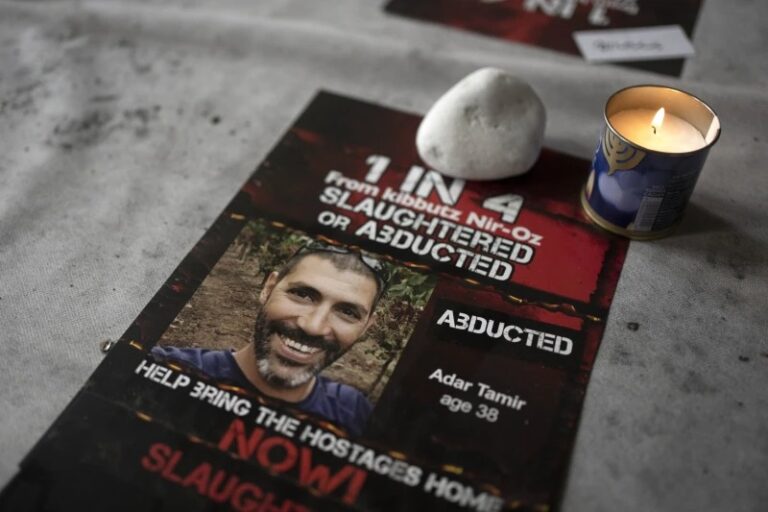 [By Rabbi Yair Hoffman for the Five Towns Jewish Times]
[By Rabbi Yair Hoffman for the Five Towns Jewish Times]
A new statement has been issued at the beginning of the month and signed by a number of purportedly Orthodox Rabbis. The statement is entitled, “To Do the Will of Our Father in Heaven: Toward a Partnership between Jews and Christians.” It was issued by an organization led by Rabbi Shlomo Riskin called, CJCUC.
Many of the authors and signers on the document are certainly brilliant scholars and thinkers. It is this author’s view, however, that the initiative, unfortunately, contains a number of serious misrepresentations and that the ideas behind the initiative are predicated upon fundamental halachic errors.
The first paragraph states that there is a historic opportunity to work together with Christian brothers and sisters to address the moral challenges of our era. While it is true that in general, Jews should work together with others to address and improve moral challenges, there is a grave distinction between working together with individuals and working together on broad denominational and organizational level. Like it or not, the churches in which Rabbi Riskin is encouraging us to work with together do not share.
What is most disturbing, however is that the document in this initiative seems to purposefully distort the Rabbinic views that it cites. An integral aspect of Judaism is honesty. The Talmud (Shabbos 55a) teaches us that “the signet ring of Hashem is Truth.” Maimonides view of Catholicism and other Trinitarian forms of Christianity is that it constituted Avodah Zarah – even for gentiles. Thus to writes that Maimonides acknowledged that “Christianity is neither an accident nor an error, but the willed divine outcome and gift to the nations” when, in reality, he viewed it as a minor step to wean off gentiles from full-fledged polytheism is disingenuous. The language that the Rambam uses is that ultimately they will learn that “sheker nachalu avosaihem.” The same holds true for Rabbi Yehudah HaLevi.
The document further reads, “In separating Judaism and Christianity, G-d willed a separation between partners with significant theological differences..”
This too is a mischaracterization of both history and Jewish theology. It is an attempt to “paper over” differences. The great theologians of Judaism all held that the idea of the Trinity was not born of Jewish origin- it’s origins were pagan. Thus, to characterize Christianity and Judaism as “partners” is also disingenuous.
The citation of Rabbi Jacob Emden is also truncated. According to Judaism there is no “common covenantal mission to perfect the world” – as the initiative would have. Such language and terminology recasts three thousand years of Jewish tradition in a manner that is quite foreign to Jewish tradition and values.
The truth is that almost all of the denominations of Christianity in which Rabbi Riskin has entered into dialogue with are halachically considered Avodah Zarah.
There are those, of course, who are members of mainstream denominations of Christianity that do not truly share the theology of their denomination. Their conceptualization of the nature of G-d is, what Rav Elchonon Wasserman describes as intuitive. In an unofficial survey, a good percentage of this country falls under this category.
There is also the view found in some Poskim that modern day practitioners of the religion are just following the ways of their parents (Maaseh avosaihem b’yadeihem), and do not truly believe in the theological underpinnings (See Shulchan Aruch, YD 148:12; Bach ibid; Responsa Yehudah Yaaleh YD #170).
Yet to enter into a partnership with the “mother group” is tantamount to partnering with Avodah Zarah.
There are denominations that even today do not subscribe to a Trinitarian doctrine. Some of these denominations could be construed as believers in shittuf, but not true Avodah Zarah. They are (1) Christadelphians, (2)Christian Scientists, (3)Dawn Bible Students, (4) Friends General Conference, (5) Iglesia ni Criso, (6) J’s Witnesses, (7) Living Church of G-d, (8) Oneness Pentecostals, (9) Members Church of G-d International, (10) Unitarian Universalist Christians, (11) The Way International, (12) The Church of G-d International and (13) the United Church of G-d.
But even partnering with these groups would be forbidden as well. The Ran’s view (Sanhedrin 61b) is that belief in any religion other than Judaism is also considered Avodah Zarah.
The well known and published views of both Rabbi Riskin’s Rebbe, Rabbi J.B. Soloveitchik and that of Rav Moshe Feinstein is that dialogue with Christian groups can and does lead to devastating results.
It is this author’s view that the RCA, the Moetzes Gedolei Torah of Agudath Israel, and NCYI should analyze the subject and issue statements condemning this initiative as an unprecedented and serious breach in hashkafa, mesorah and a grave violation of Torah.
The author can be reached at [email protected]
YWN notes that Chief Rabbi of Efrat Rabbi Shlomo Riskin has previously referred to “J” as a “model Rabbi”, and called him “Rabbi J”. [VIDEO IS BELOW]
Some excerpts of the 5 minute video:
Shalom to all. My name is Shlomo Riskin. I am the Chief rabbi of the City of Efrat…..I am an Orthodox Rabbi…and an Orthodox Rabbi who is very profoundly interested in religion in general, in Christianity, and especially in the persona of Jesus in particular….I was truly fascinated by the personality of Jesus, whom to myself I have always referred to as “Rabbi Jesus”….because I think he is indeed a “model Rabbi” in many counts…and he lived the life of a Jewish Rabbi in Israel in a very critical time in our history…..I have constantly come back to the study of his personality and his teachings which are very strongly rooted in Talmudic teachings…..”
(YWN – Israel Desk, Jerusalem)






13 Responses
It is clear to me that if “Rabbi” Riskin does not do Teshuvah soon he runs the risk of his children eventually going off the derech completely. If not them then his grandchildren. I’m sure at least one will bring disgrace to their family and he will be to blame.
Furthermore, I fear that city of Efrat may be bringing Midat HaDin upon itself by supporting him. They live not far from Chevron and need Rechamei Shamiyim to protect them. On what zechusim will they rely on?
It does not take Nevuah too see the natural outcome of this man’s actions.
“שם רשעים ירקב” – and he’s really making it happen with his own deeds…
This guy will celebrate on the 25th! He’ll make גזירת שוה the 25th ~ 25th. What a disgraceful individual.
Jews Should Not Mess with Judaism – And CERTAINLY RABBIS. For a while in the Jerusalem Post there were articles about the Chief Rabbinate not quickly reinstating Rabbi Riskin and his dispute with Israels Chief Rabbis. Why Did no One from YEshiva World, who repeatedly played videos of Rabbi Riskins statements, send a letter while I only saw letters condemning Rabbi Riskins detractors? Of course any “Rabbi’ suggesting Jesis was a “Rabbi” should be “Disrobed”! Is this a Modern Day Pfeferkorn or Min who joined with Jewry’s Persecutors trying to force Christianity on Jews? The Ramban himself was one of the Defenders of Judaism from a Jewish Apostate as well! To Praise a foreign god – messiah as a “rabbi” to earn the smiles or non-Jews is WRONG! The Question would be is Avoda Zarah or MONEY the Idol of such a “rabbi”
If I remember correctly this Riskin video is at least a year old. It deserves to be simply ignored.
What in the world is with this man and his CJCUC EIEIO. Do people eat the kashrus of the efrat rabbinate. This guy is a wacko and should be put in cherem.
He started out good . It appears he went OFF (OTD)at this point in his life. Yochanon Kohan Godol was a Tzadak 80 years & then he went off. It happens, sadly.
Christianity is Avodah Zorah exactly as Rambam states, period! Anyone who suggests that there can be any religious partnership between Judaism and Christianity is an Oved Avodah Zorah.
Comment:
The slant of this polemic article is obvious.
Start with a simple adjective: “minor” in [quote:] “Thus to writes that Maimonides acknowledged that “Christianity is neither an accident nor an error, but the willed divine outcome and gift to the nations” when, in reality, he viewed it as a minor step to wean off gentiles from full-fledged polytheism is disingenuous.” –
A MINOR step?
Read the Rambam himself: “Nevertheless, the intent of the Creator of the world is not within the power of man to comprehend, for His ways are not our ways, nor are His thoughts, our thoughts. Ultimately, all the deeds of Jesus of Nazareth and that Ishmaelite who arose after him will only serve to prepare the way for Mashiach’s coming and the improvement of the entire world…’
Is preparing the way for improving the whole world a MINOR step, as the author says, or a major step? Is it “disingenuous” to think it is a major step – or is it disingenuous to think it is a minor step??
Quote: The document further reads, “In separating Judaism and Christianity, G-d willed a separation between partners with significant theological differences..”
This too is a mischaracterization of both history and Jewish theology. It is an attempt to “paper over” differences.
Does one “paper over differences” by pointing out, as this document does, that there are “significant theological differences..”??
Quote: ” The citation of Rabbi Jacob Emden is also truncated. ” I wish the author had written the full quote [the book is not available to me], but of course in a paper one quotes the part one thinks proves one’s point. The author of this article does not do that.
Quote: ” Yet to enter into a partnership with the “mother group” is tantamount to partnering with Avodah Zarah.”
Quote: ” But even partnering with these groups would be forbidden as well. The Ran’s view (Sanhedrin 61b) is that belief in any religion other than Judaism is also considered Avodah Zarah.”
Who spoke about “belief”? ?the document said nothing about belief in Christianity – why does the author try to make the reader think that the document in any way indicates or recommend “belief”?
There are two points I would like to relate to:
1) Quote: “We recognize that since the Second Vatican Council the official teachings of the Catholic Church about Judaism have changed fundamentally and irrevocably.”
I do not know how anyone can determine that this is “irrevocable”.
2) The issue of the “covenant” of Christians: Do they have a covenant, even a covenant NOT similar the covenant of the Jews?
Well, of course, there is the Noahide covenant, but that applies to all humanity , not especially to Christians.
The issue is deeper than that. When a person turns to God and accepts God as a guide through this life – does this create a covenant between this person and God?
In this sense, Yes, there is a covenant for every person who wants one. Is there a communal, congregational covenant, say – for Christians, and another for Muslims? I would say so: The religion creates a communal covenant which is more than the covenant of an individual – just as in the Seven Noahide Laws, one of which is “Dinim” to have rule of law, which differs from community to community according to the mores and values and situation of that community [this differs from the unusual interpretation of the Remah in his Responsa siman 10].
I would like to add about the covenant. Can man initiate a covenant? I think so: שׁוֹמֵר ה’ אֶת-כָּל-אֹהֲבָיו וְאֵת כָּל-הָרְשָׁעִים יַשְׁמִיד: HaShem preserveth all them that love Him; but all the wicked will He destroy [Tehillim 145:20]: the response to love of HaShem is – HaShem will “preserve”.
It may be argued that this verse does not apply to non-Jews, but I would not be hard-pressed to refute that contention.
Prof. Marc Shapiro has proven that the Ran did NOT consider Islam to be idolatry; it is totally irresponsible for Rabbi Hoffman to say otherwise.
‘I do not know how anyone can determine that this is “irrevocable”.’
It isn’t. The Church in its entire history has only made two infallible statements and this is not one of them. A future Pope or Church Council could reverse this, but that is extremely unlikely to happen in our lifetimes. The new statement on Judaism really does have the support of most of the hierarchy today.
However, we do need to realize that the recent statements by the Catholic Church represent a 180 degree turn in their theology. Stating that God’s covenant with the Jewish people can never be broken is a categorical rejection of 1900 years of theology that argued that Christianity superceded Judaism. Two Protestant groups in the United States, the United Church of Christ and the United Methodist Church, have made almost identical statements.
And some writers, both Jewish and Christian, have been arguing that this really wasn’t a change. They don’t realize — or prefer to ignore — that in both Rabbinic Judaism and the Catholic Church, the way you accomplish major change is by pretending that it is not a change.